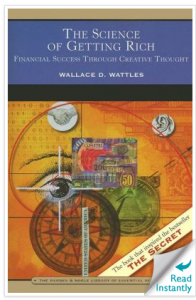About four years ago I began reading books a lot of self-help books in the bathtub. I think I did it partially because I lived in Pittsburgh in the winter and needed to stay warm. I would sit there for hours sometimes, refilling the tub with hot water. My fingers would wrinkle.
During this time I was seeking answers. Why are we here on this mostly blue planet? Why am I the way I am? What can I do to do better? How does the world work? What am I supposed to be doing in it?
I came across a book that I felt was maybe the epitome of all self-help books, and certainly was a derivative of most of the modern ones today. I was in the business section of Barnes & Noble (physically) and this small, thin book caught my attention: “The Science of Getting Rich“. The science? I didn’t know there was a science to it.
I expected with having such an outlandish title for it to have been written in the last decade, but it was published in 1910, a year after my maternal grandfather was born. Its author was born in 1860 before the Civil War began. I put it on top of my stack to purchase.
 I was captured by its old style of language and the symbolic drawings on the cover.
I was captured by its old style of language and the symbolic drawings on the cover.
“Man is a thinking center, and can originate thought. All the forms that man fashions with his hands must first exist in his thought; he cannot shape a thing until he has thought that thing.”
and
“It is a natural law that like causes always produce like effects; and, therefore, any man or woman who learns to do things in this certain way will infallibly get rich.”
There are many things that I liked about the book, and I believe every word of what it has to say. Had I followed ALL the principles in the book, I am sure I would be rich. However, there is one thing that I got out of this book that I had been lacking in my life prior and thus made a noticeable difference in my life once I began to practice it (and I believe it did create wealth for me.) This one thing is maybe the most important thing I’ve learned to date. And it completely changed my life for the better: Gratitude.
Chapter seven of the book is entirely dedicated to gratitude and the importance of being thankful for what you already have in order to gain the things that you want.
“The whole process of mental adjustment and atonement can be summed up in one word, gratitude.”
Wallace tells us:
“The law of gratitude is the natural principle that action and reaction are always equal, and in opposite directions.”
And:
“The moment you permit your mind to dwell with dissatisfaction upon things as they are, you begin to lose ground. You fix attention upon the common, the ordinary, the poor, and the squalid and mean; and your mind takes the form of these things. Then you will transmit these forms or mental images to the Formless, and the common, the poor, the squalid, and mean will come to you…
…On the other hand, to fix your attention on the best is to surround yourself with the best, and to become the best.
The Creative Power within us makes us into the image of that to which we give our attention…
…The grateful mind is constantly fixed upon the best; therefore it tends to become the best; it takes the form or character of the best, and will receive the best.”
At the time in my life when I read this book, I didn’t feel I had a lot for which to be grateful. I wasn’t that happy with my work, or lack thereof, and I felt alone and didn’t have the things I thought I wanted. And then I realized that I’m a spoiled brat. Because I had food. I had clean water. I had good health. I had a great family. So I began with these things, the things I did have. It made me much less discontent with the things I didn’t have and then, as the world did its magic, little by little I began to get the things I did want. There IS a science to it!
But being grateful is not the same as being thankful. I can be thankful that someone else is cooking Thanksgiving dinner for me today. But I am grateful for even having any kind of food on this often cruel planet in which I am just one of many. And nothing but fortune stands between me and the person who does not have enough to eat on this day. As Brother David Steindle-Rast points out in his essay “Are You Thankful or Are You Grateful?“, gratefulness is full awareness; thankfulness is thoughtfulness.
And today I am thankful for learning how to be grateful and for all of the pleasantries that have come my way since I learned this powerful mode of thinking.
- Time grabs you by the wrist, directs you where to go - January 12, 2024
- CBD Oil and My Missing Thoughts - October 26, 2023
- How Do We Stay True to Ourselves? - February 26, 2023
I’m going to give it a read. Here is a link for anyone else that wants the ebook: https://classic-books.org/the-science-of-getting-rich/
Great post! I had a friend that used to do a lot of reading in the bathtub, haha! Seems like a good place for thinking. I also need to focus on being grateful and not just thankful more often than I actually do. Thanks for sharing your thoughts! 🙂